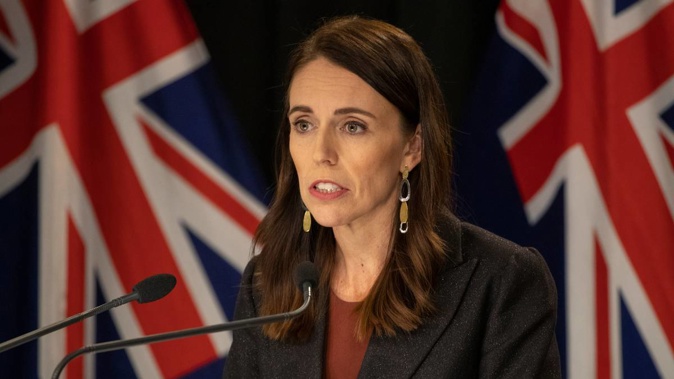
Prime Minister Jacinda Ardern has tested negative for Covid-19.
"The Prime Minister has returned a negative Covid-19 test. In line with Ministry of Health guidance she is required to continue isolating until the end of Tuesday, February 1, or as otherwise advised by Public Health," a spokesperson said today.
"She will Chair tomorrow's Cabinet meeting remotely.
As the Prime Minister is not be able to be in the Beehive in person tomorrow, Deputy Prime Minister Grant Robertson will attend tomorrow's post-Cabinet media briefing on her behalf, the spokesperson said.
Ardern and Governor-General Dame Cindy Kiro were forced to isolate Saturday after a flight attendant on their flight from Kerikeri to Auckland tested positive for Omicron.
All those on the flight are considered close contacts.
One of those close contacts, Ardern's chief press secretary Andrew Campbell, confirmed to the Herald this morning he had tested negative.
Ardern took a PCR test Sunday morning, as per Ministry of Health requirements.
"She remains asymptotic and continues to feel well," the spokesperson said yesterday.
Ardern and Kiro were returning from Waitangi on Saturday January 22 after filming pre-recorded speeches for Waitangi Day.
That flight has been deemed as "high risk" on the Ministry of Health's updated locations of interest list.
A statement released by the Prime Minister's office shortly after 10pm on Saturday said: "Whole genome sequencing for the case has been requested with an expected result on Sunday.
"The result is expected to indicate that the case has been infected with the Omicron variant and the public health response reflects this.
"All other passengers on board NZ8273 are also deemed close contacts and are required to self-isolate, get tested immediately and remain in isolation for 10 days following their exposure."
They will also need to follow further isolation and testing requirements provided by public health officials.
"The Prime Minister is asymptomatic and is feeling well," a statement issued on Saturday night said.
"In line with Ministry of Health advice she will be tested immediately [on Sunday] and will isolate until Tuesday.
"The Governor-General and members of her staff were also on board and are following the same isolation instructions.
"The Prime Minister and Governor-General were in Northland undertaking advance filming at the Waitangi Treaty Grounds, at the invitation of the Waitangi National Trust for the Waitangi Day broadcast."
Since last Saturday Ardern has attended several events.
On Sunday, January 23 she announced all of New Zealand would move to the red traffic light setting.
On Tuesday, she announced changes to New Zealand's mask-wearing protocol as Omicron cases rise.
On Thursday the PM also visited a vaccination centre in Lower Hutt alongside Covid Response Minister Chris Hipkins and other MPs.
Act Party leader David Seymour said the fact it had taken seven days to identify close contacts showed contact tracing was a "costly charade" that had little effect on the spread.
"Once again the Government has been caught taking a nap as it takes seven long days to identify close contacts of Omicron," Seymour said.
"Jacinda was a close contact of an Omicron case a week before it was made public. She was a close contact on Saturday 22nd and the public was informed on Saturday a week later.
"This experience should be a turning point for Jacinda's approach to Covid. She might ask herself, 'Why am I isolating when contact tracing is too slow for it to be effective, maybe we should stop forcing otherwise healthy people to isolate if it makes no difference? How many other people am I willing to put through this?'"
It is not yet clear when the original case tested positive for Covid.
As the PM and Governor-General isolate, New Zealanders have been told they should expect Covid-19 cases to roughly double every three days from now on and to assume all new infections are Omicron.
Yesterday, there were 103 new community cases.
The Ministry did not say how many of those cases had been confirmed as Omicron.
There is usually a lag before officials confirm through whole-genome sequencing whether a person has caught the Delta or Omicron variant of the virus.
But it's likely many of the community cases will be Omicron given the new variant is much more transmissible and has rapidly become dominant wherever it has taken hold.
University of Auckland Covid-19 modeller and expert in the spread of complex networks, Dr Dion O'Neale, said at this stage of the Omicron outbreak we should assume all new cases are of that more infectious variant.
"Even if we expected Delta numbers to be growing a little bit as people came back from holiday, it was only a few days ago that we had enough Omicron cases to be comparable to Delta.
"We'd expect from that point Omicron to grow much faster, if for no other reason than the current vaccine levels are giving you much more protection against Delta than they are against Omicron."
Active cases being treated as Omicron have now been detected in Auckland, Waikato, Bay of Plenty, Taranaki, MidCentral, Canterbury, Tairāwhiti/Gisborne and Nelson-Tasman.
Take your Radio, Podcasts and Music with you









